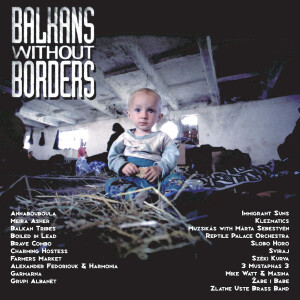 Brendan Foreman wrote this review.
Brendan Foreman wrote this review.
When the lights go out, when the food disappears,
when death is ever-present, you still find music.– David Wilson, director Pavarotti Music Centre, Mostar
In response to the extreme violence and poverty that has been visiting the Balkan world for the past decade, NorthSide Records has compiled this benefit CD featuring the modern sounds of Balkan music. The proceeds for this CD will go to the independent emergency relief organization Doctors Without Borders / Médecins Sans Frontières.
The artists featured here have all donated their songs to this CD. Many artists, such as Boiled in Lead, Muzsikas, and Charming Hostess, contributed tracks from previous albums. Others contributed previous unreleased material. A few artists including American punk rock bassist Mike Watt and Macedonian group Masina, and the Greek singer Annabouboula, to name a few, actually recorded their singles especially for this CD.
Almost all of the groups on this CD combine elements of modern music with the traditional forms of Eastern Europeans. This isn’t always such a good idea. Mixing techno and house music with traditional sounds may seem fun at first, such as Grupi Albanet’s version of the Albanian love song “Hajde Bukuri” and Balkan Tribes’ remix of the Macedonian saber dance “Zurle.” But both songs suffer from too much repetition and, more importantly, little interaction between musicians.
However, most of the artists here allow the modern and the traditional to live together quite harmoniously. The opening track “Dali Tzerni” by the remarkable California ensemble Charming Hostess provides a trio of wailing women and minimal fiddle line over a fairly standard rock band of bass, guitar, and drums. The result is the most rocking song I’ve heard in a while. “Esma” by Slobo Horo is a popular Rom song given a Bo Diddley guitar beat, creating a very strange yet appealing combination of mid-Fifties rock ‘n roll sounds with the traditional rhythms and harmonies of Eastern European music. Farmers Market provides the startling “Gankino Horo,” a Bulgarian dance tune played to a thrash tempo. Annabouboula gives the Ionian Greek anthem “Ti Se Meli” a Caribbean-flavored rhythm.
There are, of course, a few completely traditional tracks here. Hungarian revivalists Muzsikás provide a compelling Romanian dance song “Maramarossi Tancok,” collected by composer and proto-ethnomusicologist Bela Bartok way back in the 1920s. The Zlatne Uste Balkan Brass Band with the singing of Romany chanteuse Usnija Redzepova, provides an excellent and seductive example of the traditional sounds of Serbian brass bands with “Kako Kolan Da Se Vijem”: “Come on dance, forget the belt… Better that my gentle arm wind around your waist.”
Even punk rocker Mike Watt joins in with the traditional, joining with Macedonian band Masina to record “Izniknami Badem Drvo.” Watt proves once again what a kick-ass bassist he is, flawlessly creating a simple yet staggered bass line that drives the song forward.
There are a couple of songs that could be considered the anthems of this CD. The Klezmatics’ version of “An Undoing World” from Tony Kushner’s theatre piece It’s an Undoing World, or Why Should It Be Easy When It Can Be Hard, poetically describes the plight of unwanted refugees, a common theme through much of Balkan history:
Mother for your derelicted
Children from your womb evicted
Grant us shelter harbor solace safety
Let us in!
Let us tell you where we traveled
How our hopes our lives unraveled
How unwelcome everywhere we’ve been.
The music with its one-two piano beat and ragged violin feels like a return to the Jewish theatre groups of Germany in the 1920s, while the imagery of the lyrics easily recalls those of Kurt Weill. A chorus, singing in unison near the end gives this song a slightly reassuring ending, a feeling that “at least, we’re all in this together.”
There is no such reassurance in “Tiring Night” by Meira Asher & Kočani Orkestar. The narrator of this eerie song is hiding her child away to safety just before being taken away to be killed by soldiers. Everything about this song is played rough, from Asher’s harsh singing to plodding brass band backing her. To give an even more immediate sense of place, sounds of a train station are recorded in front of the actual music, giving the aural perspective of someone in the station listening to a distant group of musicians. As the dire outcome of the song nears, the listener moves closer and closer to the musicians, until they are finally locked up in a train car and whisked away. For a truly scary 20 seconds, all we hear is the sound of the train car moving along its tracks. The song ends with a vaguely triumphant dance song played by the Kočani Orkestar. But the triumph seems hollow; the woman is dead nevertheless, the child without a mother.
Balkan Without Borders ends with selections from two prominent groups from the Omnium label. Three Mustaphas Three provides a previously unreleased live version of “Anapse To Tsigaro,” a Greek song of defiance to tough times: “Light a cigarette and to Hell with the world!” The jam session that ensues, expresses this sentiment with abandon. Finally, Boiled in Lead finishes the CD with “Shopetzki Kopanitsa,” a three-part Bulgarian dance set from their seminal release From the Ladle to the Grave.
This CD cuts across the spectrum of Balkan music from the Mediterranean to the Baltic Sea, from the Ural River to the Ruhr, and stretching even beyond those boundaries. Taken as a whole, it clearly shows the shared musical and cultural heritage that all of the people of the Balkans share, a heritage that, given the current violence of the region, is that much more heartbreaking to witness.
The website for Balkans Without Borders contains loads of information about these groups as well as more information on Doctors Without Borders.
(Omnium, 1999)
